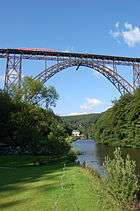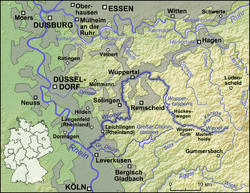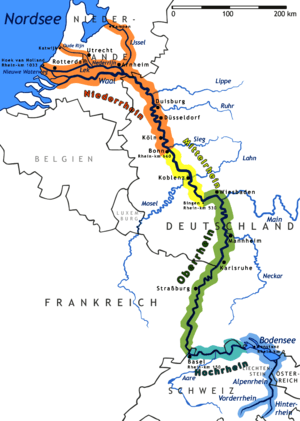Wupper
The Wupper is a right tributary of the Rhine in the state of North Rhine-Westphalia, Germany. Rising near Marienheide in western Sauerland it runs through the mountainous region of the Bergisches Land in Berg County and enters the Rhine at Leverkusen, south of Düsseldorf. Its upper course is called the Wipper.

| Wupper | |
|---|---|
 Wupper | |
| Location | |
| Country | Germany |
| Physical characteristics | |
| Source | |
| • location | Sauerland |
| • elevation | 441 m (1,447 ft) |
| Mouth | |
• location | Rhine |
• coordinates | 51°02′43″N 6°56′27″E |
| Length | 115.8 km (72.0 mi) [1] |
| Basin size | 813 km2 (314 sq mi) [1] |
| Discharge | |
| • average | 17 m3/s (600 cu ft/s)[2] |
| Basin features | |
| Progression | Rhine→ North Sea |
| Tributaries | |
| • left | Dhünn |
On its course of about 116 km, the Wupper passes through the city of Wuppertal where the suspension railway runs for 10 kilometres above the river.
It is crossed by the highest railway bridge in Germany near Müngsten, between Remscheid and Solingen. A few kilometers further down, Burg Castle is located on a hill overlooking the river.
Hydropower
From the 15th century, the Wupper and its numerous streams gave birth to hundreds of workshops, mills and factories on their banks. Originally water was used for dying, bleaching and washing canvas and cloth,[3] later it was used to power machines or transport waste.
The Wupper thus facilitated the early industrial expansion of Wuppertal (German for "Wupper Valley") during the 18th, 19th and early 20th century. The Wupper Valley was one of world's first industrialized regions and empowered inter alia the Ruhrgebiet as a coal-mining region.

Tributaries
The following rivers are tributaries to the river Wupper (from source to mouth):[1]
- Left: Gaulbach, Brunsbach, Pixwaager Bach, Dörpe, Wilhelmstaler Bach, Hardtbach, Lohbach, Nöllenberger Bach, Stoffelsberger Bach, Hofsiefen, Hengstener Bach, Steinhauser Bach, Lohmühlenbach, Herbringhauser Bach, Marscheider Bach, Eschensiepen, Blombach, Norrenberger Bach, Murmelbach, Fischertaler Bach, Springer Bach, Kothener Bach, Auer Bach, Bendahler Bach, Klusensprung, Holzer Bach, Hatzenbeck, Ossenbeck, Rutenbeck, Glasbach, Burgholzbach, Weilandsiepen, Kaltenbach, Morsbach, Eschbach, Sengbach, Weltersbach, Murbach, Wiembach, Dhünn.
- Right: Kerspe, Hönnige, Neye, Bever, Frohnhauser Bach, Wiebach, Kretzer Bach, Uelfe, Remlingrader Bach, Spreeler Bach, Steinhauserbergbach, Nebenkämper Siefen, Ehrenberger Bach, Steinbruch Siefen, Schmitteborner Bach, Hebbecke, Schwelme, Schwarzbach, Leimbach, Schönebeck, Mirker Bach, Briller Bach, Varresbeck, Lüntenbeck, Rottscheider Bach, Buchenhofener Siepen.
Other
- On 21 July 1950 a young elephant named Tuffi, made to ride on the train by her handler as an advertising stunt, decided she didn't like the ride, panicked (and panicked the other, human, passengers), burst out of the car she was riding in, and jumped or fell into the Wupper, only slightly injuring herself. In 1970 Marguerita Eckel and Ernst-Andreas Ziegler published a children's picture book about the incident, Tuffi und die Schwebebahn.
- The Wupper is cited in the German sayings: "Über die Wupper gehen", literally "To go over the Wupper", metaphorically meaning "going bankrupt", "going into jail" or "going to die".[4]
- Else Lasker-Schüler wrote a drama entitled Die Wupper.
References
- Hydrographic Directory of the NRW State Office for Nature, the Environment and Consumer Protection (Gewässerverzeichnis des Landesamtes für Natur, Umwelt und Verbraucherschutz NRW 2010) (xls; 4.67 MB)
- Die Wupper // Wupperverband (in German)
- "Cloth Bleaching alongside Wupper River". Municipality of Wuppertal. Retrieved 12 January 2011.
- Rolf-Bernhard Essig. "Woher kommt "Über die Wupper gehen"?" (in German). SWR. Retrieved 2 September 2014.
| Wikimedia Commons has media related to Wupper. |
| Wikisource has the text of the 1911 Encyclopædia Britannica article Wupper. |
